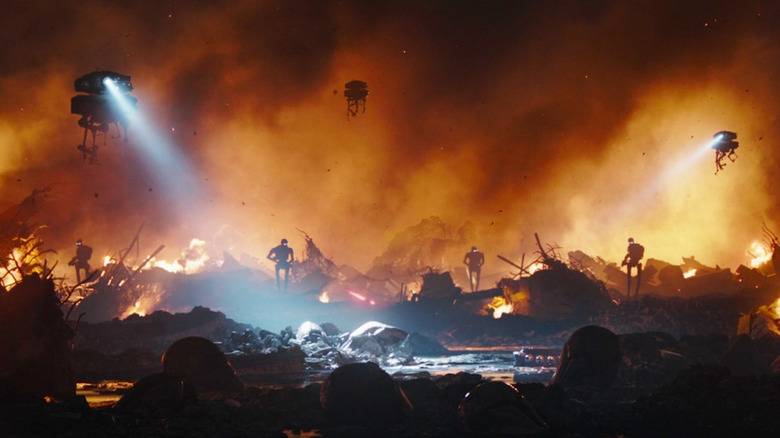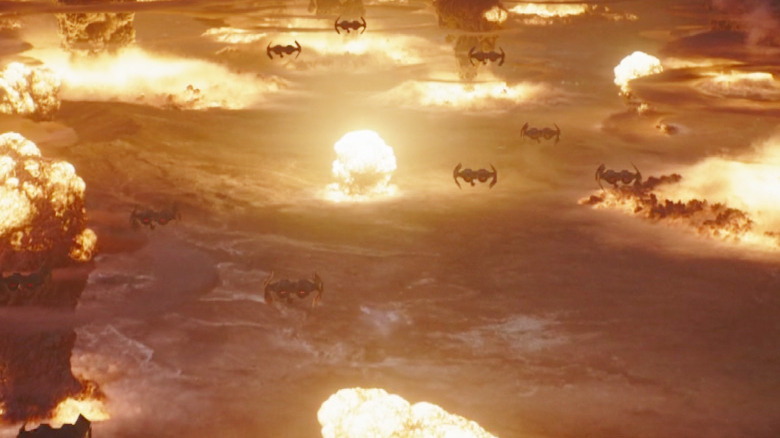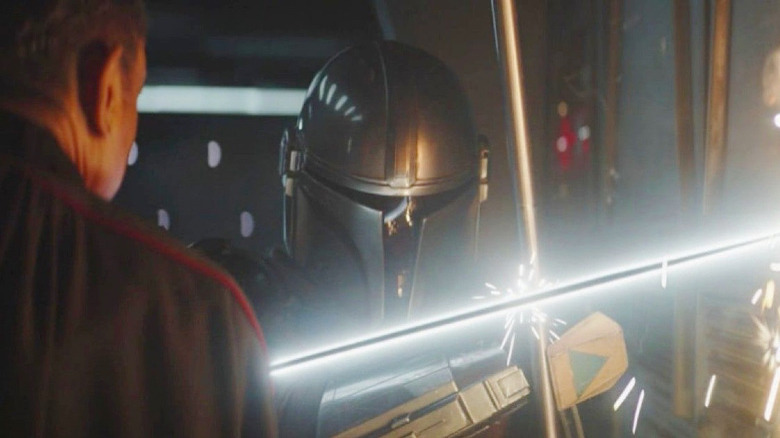The Siege Of Mandalore And The Night Of A Thousand Tears Explained
This article contains spoilers for the new episode of "The Book of Boba Fett."
"The Book of Boba Fett" took a welcome break from Boba's turf war on Tatooine this week to catch up with everyone's favorite space dad: Din Djarin. Appropriately titled "The Return of the Mandalorian," the episode set the stage for Din to join Boba in his battle with the Pyke Syndicate while touching upon a tragic event from Mandalore's past that was previously referenced but otherwise left unexplained on "The Mandalorian." In doing so, "The Book of Boba Fett" also answered a question that's been hanging in the air ever since Din took the Darksaber from Moff Gideon in the "Mandalorian" season 2 finale.
"Return of the Mandalorian" picked up with Din tracking down and killing a bounty with the aid of the Darksaber, only to injure himself with his own weapon like the lovable himbo he is. Upon his reunion with the surviving members of The Tribe (whom he located using the information he got after collecting on said bounty), the Armorer gave Din a crash-course in the history of the powerful lightsaber and its grim legacy. This is also where "The Book of Boba Fett" flashed back to the Galactic Empire's massacre of Mandalore's people on what would come to be known as the Night of a Thousand Tears.
The Great Purge of Mandalore
Before we go any further, it's worth noting that "The Siege of Mandalore" can refer to one of two events, depending on the context. The first one, also known as the Battle of Mandalore, took place at the end of the Clone Wars and saw the Mandalorian resistance (led by Bo-Katan Kryze) team up with the Galactic Republic to retake control of Mandalore from Darth Maul and the Shadow Collective (as depicted in the final season of the animated "Clone Wars" TV show). However, when Moff Gideon mentioned the Siege of Mandalore to Din on "The Mandalorian," what he was really talking about was the Great Purge of Mandalore shown in "Return of the Mandalorian."
After the Battle of Mandalore and the fall of the Republic, the Galactic Empire took control of Mandalore through military force, removing Bo-Katan from power and once again robbing her of her birthright. Years later, as seen on the animated series "Star Wars Rebels," the Mandalorian warrior-turned-Rebel-fighter Sabine Wren would gift the Darksaber to Bo-Katan after recovering it (okay, stealing it) from Maul on Dathomir. This allowed Bo-Katan to unite the other Mandalorian clans in an effort to reclaim their home world from the Empire.
Of course, in a turn of tragic irony, this proved to be Bo-Katan's downfall. When the Empire realized it could no longer maintain control of Mandalore in the face of this newly-formed resistance, it resorted to obliterating the planet's most densely populated regions (including its capital city, Sundari) during the Night of a Thousand Tears, before later recovering as much of the world's remaining beskar as it could find. "Had our sect not been cloistered on the moon of Concordia, we would have not survived the Great Purge," the Armorer explains to Din while recounting these events.
The Curse of the Darksaber
Because of all this, the members of The Tribe (and the Children of the Watch at large) see Bo-Katan as a cautionary tale of what will happen if a Mandalorian fails to honor the ancient creed dictating that ownership of the Darksaber can only be won through combat (with the Armorer going so far as to call it "a curse unto the nation," under those circumstances). This, in turn, explains why Bo-Katan refused to accept the Darksaber when Din offered it to her in the "Mandalorian" season 2 finale, much to the delight of the newly-defeated Moff Gideon (who, unsurprisingly, wasn't above indulging in a bit of schadenfreude).
Even so, this still begs the question: Why didn't any of this stuff about the Darksaber come up back when Sabine gifted the weapon to Bo-Katan (who barely paused before accepting it)? The in-universe explanation might be that Bo-Katan and the others either didn't really know all that much about the Darksaber's history or simply didn't take the prophesied curse from the Darksaber's ancient creed seriously. (And why should they have?) In terms of the real world, though, it's probably safe to assume "The Book of Boba Fett" and "The Mandalorian" executive producer Dave Filoni merely hadn't planned things out quite that far ahead back when he was the supervising director on "Rebels." Either way, you can consider this plot thread airtight once again. (No doubt, Ben Wyatt would approve.)
New episodes of "The Book of Boba Fett" premiere Wednesdays on Disney+.


